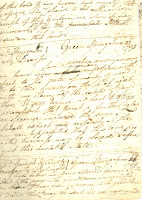Happy Earth Day! I thought we could use this opportunity to talk a bit about environmental education at Stratford Hall. Many people know us as a historic site, but we're always expanding our program offerings to include even more than history. With these changes, we'll address more of Virginia's Standards of Learning for school programs--not just history, but science and math, as well. While we have a start on this already, with a new fossils program and an architecture program we added last year, we're working harder to continually update and offer more options to teachers.
Something I'm very excited about is a new environmental school program I'm designing. As you probably know, Stratford Hall is located right on the Potomac River, which gives us ample opportunities to discuss environmental issues with school children and adults. Our new program will focus on a variety of topics: pollution in the Potomac River/Chesapeake Bay, recycling, conservation of water...and if it gets too big (which it may!), we'll split it into several different programs. I've gotten a lot of ideas for--and help with--this program from members of the Education team at Friends of the Rappahannock and the Three Rivers Environmental Educators (TREE).
This short blog posting all came about because today is Earth Day, and Earth Day should remind us all how important it is to recycle. Did you know th at Cynthia Vanderlip, manager of the State of Hawaii’s Kure Atoll Wildlife Sanctuary, cut open the dead body of a fledgling albatross to find more than half a pound of plastic in its stomach? This picture shows all of those pieces--bottle caps, plastic lighters, etc. We shouldn't be thinking about taking care of the earth only on Earth Day, but this specific day does serve as a reminder to become more conscientious individuals. So next time you're on a beach, pick up that plastic bottle you see washing up to shore. And if you don't already, please start recycling. It's not a difficult thing to do, but will really make a difference in the end.
at Cynthia Vanderlip, manager of the State of Hawaii’s Kure Atoll Wildlife Sanctuary, cut open the dead body of a fledgling albatross to find more than half a pound of plastic in its stomach? This picture shows all of those pieces--bottle caps, plastic lighters, etc. We shouldn't be thinking about taking care of the earth only on Earth Day, but this specific day does serve as a reminder to become more conscientious individuals. So next time you're on a beach, pick up that plastic bottle you see washing up to shore. And if you don't already, please start recycling. It's not a difficult thing to do, but will really make a difference in the end.
 at Cynthia Vanderlip, manager of the State of Hawaii’s Kure Atoll Wildlife Sanctuary, cut open the dead body of a fledgling albatross to find more than half a pound of plastic in its stomach? This picture shows all of those pieces--bottle caps, plastic lighters, etc. We shouldn't be thinking about taking care of the earth only on Earth Day, but this specific day does serve as a reminder to become more conscientious individuals. So next time you're on a beach, pick up that plastic bottle you see washing up to shore. And if you don't already, please start recycling. It's not a difficult thing to do, but will really make a difference in the end.
at Cynthia Vanderlip, manager of the State of Hawaii’s Kure Atoll Wildlife Sanctuary, cut open the dead body of a fledgling albatross to find more than half a pound of plastic in its stomach? This picture shows all of those pieces--bottle caps, plastic lighters, etc. We shouldn't be thinking about taking care of the earth only on Earth Day, but this specific day does serve as a reminder to become more conscientious individuals. So next time you're on a beach, pick up that plastic bottle you see washing up to shore. And if you don't already, please start recycling. It's not a difficult thing to do, but will really make a difference in the end. 



